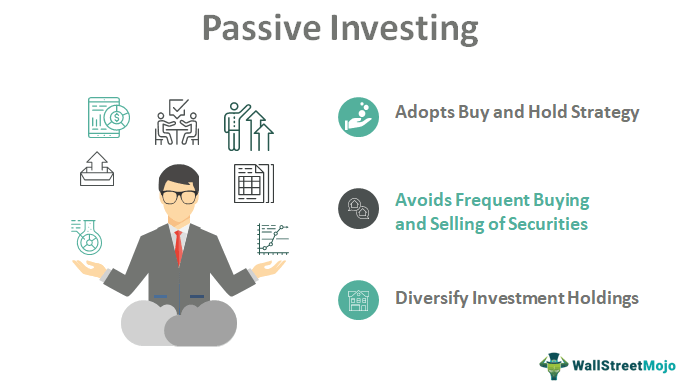Everything You Need to Know About the Best Passive Investing Strategy
Oct 02, 2022 By Triston Martin
Introduction
In finance, the term "passive income" refers to earnings from an investment made once that continue to accrue without any further action on the part of the investor. Although the Internal Revenue Service (IRS) treats passive and active income (such as salary) differently, both are subject to taxation. Passive losses, for instance, can balance out passive gains. Passive income is sought for various reasons, including tax advantages. Work-from-home and part-time jobs that don't require much brain power have helped popularise the term (even though they may be taxed as active income).
Becoming a limited partner in a business is one strategy for earning passive income. However, regular people can find other places to invest their money. The Internal Revenue Service (IRS) provides a different tax treatment for active versus passive income. Passage losses can be used to cancel out passive gains when filing your taxes. Becoming a limited partner in a business is one way to passively make money on the side. Every day, people have other options for putting their savings to work for them. We recommend giving the passive investment methods described below a closer look.
Index Funds

Index funds are a type of investment fund that tracks a market index's performance through a benchmark index. These funds are passively managed to replicate the performance of the index they follow. As a result, their underlying securities remain constant unless and until the index's constituents change. This means investors will benefit from lower management fees and turnover rates, making the investment more advantageous from a tax perspective.
Real Estate
Investment in real estate continues to be favoured by those seeking long-term returns, despite the market's ups and downs over the past few years. Apartment owners, in particular, can secure a reliable income stream from rental properties. An investor can acquire a property with as little as 20% down and then fill it with tenants who will ensure a steady income stream. Real estate investment trusts (REITs) are a viable option for those who do not wish to take on the responsibility of managing rental properties.
REITs distribute 90% of their taxable income to shareholders as dividends. Regarding taxes, dividends are treated as ordinary income, which can be problematic for those in higher tax brackets. Equity crowdfunding for real estate offers a pragmatic compromise. Equity and debt investments are available in both commercial and residential real estate. Crowdfunding allows investors to reap the depreciation deduction and other benefits of direct ownership, unlike REITs, without taking on the responsibilities of actual landlords.
Peer-to-Peer Lending
Although the P2P lending industry (also known as crowdfunding) is only a little over a decade old, it has expanded tremendously over the past decade. Peer-to-peer lending refers to lending money directly to an individual or a business with the help of online intermediaries like Prosper and LendingClub. Investors can expect returns of 7% to 12% on their money with minimal effort required beyond providing initial loan funding. There are typically lower entry requirements for P2P programmes than other investment vehicles. For instance, as little as $25 can be invested to help fund a loan. Crowdfunding is legal under Title III of the Jumpstart Our Business Startups (JOBS) Act, but each P2P platform has its requirements for who can participate.
Dividend Stocks
Stocks that pay a dividend are a popular choice because of the ease with which they can be used to generate passive income. Dividends are a way for publicly traded companies to distribute a portion of their profits to their shareholders. The money can be withdrawn or reinvested in more shares, whichever the investor prefers. Dividend yields are not only highly variable from one company to the next but also from one year to the next. If you're looking to invest in dividend stocks but aren't sure where to start, stick with companies that have been "dividend aristocrats" for at least 25 years.
What Is the Highest Paying Passive Income Investment?
The optimal passive investment will change from time to time and from one year to the next due to several factors. Compared to other asset classes, real estate (whether owned outright or indirectly through REITs) and dividend-paying stocks have historically performed better.

Conclusion
A growing number of retail investors prefer passive investing. It's a simple and inexpensive way to put money to work in the market and eliminates the need to keep tabs on individual stocks. This approach is based on the belief that the rising stock market will reward patient investors in the long run. Further, the most money can be made with the least amount of trading.
Even though there are drawbacks to the buy-and-hold strategy, it isn't appropriate for everyone. Those looking to save for the future, like retirees, are the best candidates for passive investing because of the long-term nature of their goals. The opposite is true for investors who prefer active management of their portfolios or who lack the patience necessary for a passive approach. They can take an active approach if they want to try beating the market and are willing to pay higher fees.

Susan Kelly Jun 03, 2023
What Is a 1099 Form: An Overview
49133

Triston Martin Oct 02, 2022
Everything You Need to Know About the Best Passive Investing Strategy
28389

Susan Kelly Oct 14, 2022
The 5 Essentials of an Estate Plan
58491

Susan Kelly Aug 25, 2022
Different Features of Tier 1 Capital Ratio
9828

Triston Martin Apr 10, 2023
High-Yield Monthly Dividend Stocks
79105

Triston Martin Aug 30, 2022
Quantitative Analysis of Hedge Funds
62118

Triston Martin Apr 27, 2023
Best Part Time Jobs With Benefits
38670

Susan Kelly Nov 09, 2023
Detailed Guide on How to Transfer American Express Points to Delta
90633